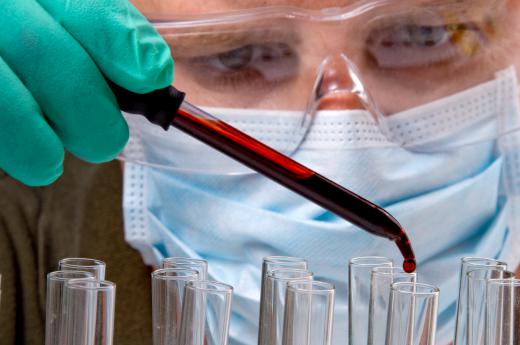What is Forensic Science?
 Mary McMahon
Mary McMahon
Forensic science is a broad discipline within the sciences and the law enforcement community which uses science to answer questions pertaining to legal situations, including criminal and civil cases. Within forensic science, there are a number of individual disciplines, ranging from forensic anthropology to forensic veterinary science. Practitioners in this field are part of an ancient tradition in which the facts of legal cases are analyzed in a scientific manner to gain information which can be used in investigation and eventual prosecution.
Numerous cultures have a long history of using forensic science in legal investigations, ranging from Archimedes, who used information about buoyancy to prove that a gold crown was a fake, to Chinese investigators who fingered criminals by asking suspects to present farm implements and waiting to see which implement flies settled on, indicating the presence of blood. Interest in the forensic sciences exploded in the 20th century with the general advancement of scientific knowledge, including the development of tools like DNA analysis and complex chemical analysis which proved to be invaluable for forensic science.

Within the field of forensic biology, which applies biology to living organisms involved in criminal cases, one can find forensic botany, forensic odontology, forensic entomology, forensic pathology, veterinary forensics, and forensic anthropology. Some other examples of fields in forensic science include forensic psychology, forensic meteorology, forensic chemistry, forensic engineering, forensic psychiatry, forensic geology, forensic photography, forensic document examination, forensic chemistry, digital forensics, and forensic archeology.

Practitioners of forensic science have extensive training in their field of expertise, paired with training in handling evidence to maintain the chain of custody and integrity of the evidence. They are skilled at evaluating evidence from a crime scene using the principles of the scientific method, and they can generate reports based on factual material which can help members of law enforcement find criminals and successfully convict them. They can also testify in court about how evidence was gathered, handled, and analyzed, and about the types of equipment used in forensic laboratories to gather information from evidence.

This field is far from a magic bullet. It can take time and patience to get useful results from a forensic scientist, and forensic scientists are not infallible. Some of the practices within this discipline have been called into question and challenged on legal grounds, especially when they were new, and some historic trends in forensic science have been soundly debunked, such as phrenology, the study of bumps on the human head to gain insights into character.
AS FEATURED ON:
AS FEATURED ON:

















Discussion Comments
I'm looking towards this as a major. I've always loved solving and analyzing things. It explains why I overthink things too much. I got a better understanding, thanks! I'm a high school senior so it's tough.
You know that sometimes forensic scientists take several weeks, sometimes a month, to solve the problem. But if you are really interested in this kind of job, go for it!
Interesting field. I will like my son to start it as a career. Very challenging. Then my son will serve his beloved country Pakistan.
I think a lot of people want careers in forensic science now, because of so many shows like CSI and Dexter and so forth making it look glamorous. They make it look like it only takes a week at the most to solve each crime, and that evidence is put in a plastic bag, "tested" and then the crime is solved. It's usually has a lot more work, and fewer results than that.
It can be an interesting career, but it takes a lot of paperwork and precision, and long hours doing repetitive tasks. If you like science classes, even doing the boring stuff, you might like this kind of job, but if you think you'll be allowed to make arrests or anything like that you are mistaken.
The history of forensic science must be really fascinating. I think they should make a TV show with people who investigate crimes a few hundred years ago, before modern equipment was available.
The character Sherlock Holmes was an forensic scientist, and the fact that the author of those books was able to figure out so many ways to investigate crime back before modern techniques were invented is really cool.
Sounds very interesting. I want to have a go at using the equipment!
Post your comments